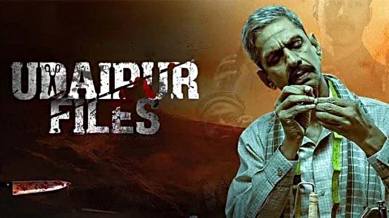Stay updated with the latest - Click here to follow us on Instagram
‘You acted as appellate authority’: Delhi HC asks Centre if it exceeded its powers by suggesting 6 cuts in ‘Udaipur Files’
The petitioner argued before the Delhi High Court that the Centre exercised its revisional powers over the film ‘Udaipur Files’ in a manner that contravenes the Cinematograph Act.

The Delhi High Court on Wednesday orally asked the Centre if it has exceeded its powers as a revisional authority and instead ventured into being an appellate authority by suggesting six cuts to the film Udaipur Files. The Centre is expected to respond to the court’s query on Friday.
The bench of Chief Justice D K Upadhyaya and Justice Tushar Rao Gedela was dealing with a petition by Mohammad Javed, an accused in the murder of Udaipur-based tailor Kanhaiya Lal on alleged communal grounds, which purportedly forms the basis of the film. Javed is seeking a postponement in the movie’s release until the trial ends, emphasising that it will jeopardise his right to a fair trial.
monthly limit of free stories.
with an Express account.
Earlier this month, Darul Uloom Deoband principal Maulana Arshad Madani had filed a Public Interest Litigation (PIL) pointing out that the movie is “replete with dialogues and instances that had led to communal disharmony in the very recent past and thus carry every potential to again stoke the same communal sentiments”.
On July 10, the high court had temporarily stayed the film’s release while allowing those aggrieved by the purported vilification of Muslims in it to represent before the Central government and seek a review of the CBFC’s decision to greenlight the release. The court had noted that provisions under the Cinematograph Act empower the Centre to exercise revisional powers over the Central Board of Film Certification’s (CBFC) certification of a film.
Javed, represented by Senior Advocate Menaka Guruswamy, argued before the bench on Wednesday that the Centre has exercised its revisional powers in a manner that contravenes the statutory scheme prescribed under the Cinematograph Act.
Guruswamy submitted, “The statute, as it stands today, envisages three kinds of revisional powers that can be exercised by the central government. The legislature never intended the Central government to be the film board…it’s a revisional power, they are not the board, they could not have suggested cuts.”
Under Section 6 of the Act, the Central government, while exercising revisional powers over CBFC certification already granted to a film, may either deem it to be an uncertified film in the whole or any part of India, or change the rating of certification, or may suspend the exhibition of the film.
The Centre, represented by Additional Solicitor General Chetan Sharma, on Wednesday argued that in exercise of its revisional powers it had constituted a committee of five members which included members from the Ministry of Information and Broadcasting, Ministry of Home Affairs, and three others, which then recommended six cuts to the film which the filmmakers incorporated. The court, however, inquired if the Centre had exceeded its jurisdiction given the specific contours in which it can exercise its revisional powers as outlined under Section 6.
Chief Justice Upadhyaya orally posed a question to ASG Sharma, saying, “The kind of order you passed, suggesting for six cuts, whether this revisional authority is available with you?…Central government can only pass 3 (types of) orders, as enumerated under section 6 (2) (of the Cinematograph Act)… This committee (of five members) was formed to aid the ministry (of Information and Broadcasting), and based on the recommendations, the ministry could have passed an order as per Section 6… By suggesting cuts, you have acted as an appellate authority…”
“It is the case of (Centre exercising its revisional powers) outside its jurisdiction… You are not exercising administrative powers, it is a statutory remedy which the petitioners were relegated to and if you are exercising the revisional powers, you have to exercise it within the four corners which confer that power,” he added.
The bench has now kept the matter for further consideration on August 1, when the Centre is expected to explain its position on the court’s query.